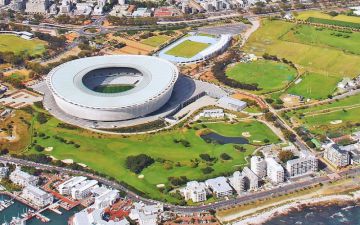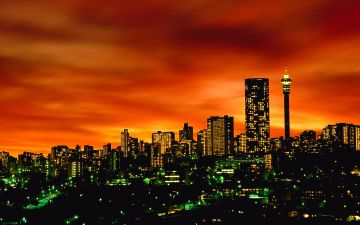Be welcome
The Republic of South Africa is a land like no other. The only country to border on both the Atlantic and Indian Oceans, it has over 1,700 miles (2,798 km) of shoreline at the southernmost tip of Africa. Most of its citizens descend from Bantu-speaking peoples, but it also has the continent's largest numbers of white Europeans, Asians (Indian) and mixed race, "coloured" in South African parlance. It has plants and animals found nowhere else in the world and some of the richest mineral resources found anywhere.
The country's turbulent past includes colonization by the Dutch and the English, bloody wars and nearly a century of apartheid or racial segregation. But the country has a diverse cultural life and 10 Nobel Laureates: four in peace, two in chemistry, two in literature and three in medical sciences.
For tourists, it is full of marvels. Africa's exotic wildlife is most easily accessed on self-drive safaris in Kruger National Park. The biodiversity of the Western Cape is unmatchable. Cape Town has become the top LGBTQ destination, particularly in the northern hemisphere's winter months when it is summer in South Africa.
For the LGBTQ community, homosexuality was a crime punishable by seven years in jail under apartheid. Gay political activists operated underground and were considered subversive by the regime. Things began to change in the 1990s with Africa's first Pride march in Johannesburg in 1991. In 2006 South African became the first African country to legalize same-sex marriage. Workplace discrimination on the basis of sexual orientation now is banned.
But on the downside, clergy has the right to deny marrying same-sex couples, and the nation continues to have the world's biggest and most high profile HIV epidemic. "Corrective rapes" of black lesbians in townships (traditionally non-white neighborhoods) have increased. Although visitors to large cities will find LGBTQ-welcoming communities, homophobia continues to exist in townships and conservative rural areas. A Pew Research Center study in 2013 found that 61 per cent of South Africans believe society should not accept homosexuality. Outside urban centers, it might be wise to avoid advertising sexual preferences.
Nonetheless, progress continues to be made. The Jozi Cats, Africa's first competitive gay and inclusive rugby team, was formed in 2015. The International Gay & Lesbian Travel Association held its first conference in Africa in Cape Town in 2016. Cape Town has announced plans to bid to host Gay Games in 2026.
been therewishlist

